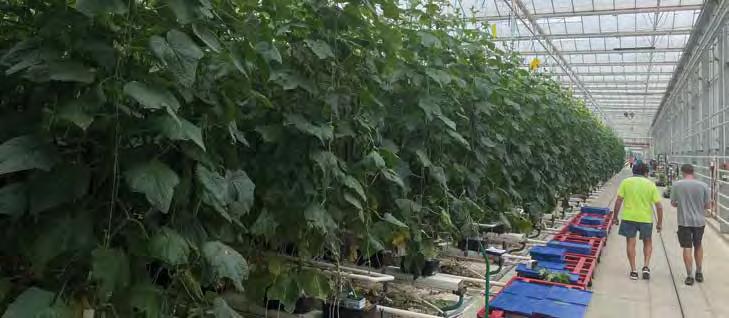
3 minute read
Vegetables NZ Inc
FOOD SECURITY’S
A JOINT EFFORT
Words by Antony Heywood : General Manager, Vegetables New Zealand Inc.

NZ Cucumber is our largest producer of cucumbers. Without labour, its multimillion-dollar business is at risk
Food security needs to be a joint effort by all of New Zealand because we all have an interest in it: • Growers need labour to pick their crops. • Government needs employment. • People need work. • People need locally produced food.
It seems a simple equation but for a number of reasons, the planets do not align and growers are in desperate need of labour to pick their crops. Why is this year different from any other year? Why is labour an issue? Much of it falls at the feet of Covid-19 and how it has severely limited the number of Recognised Seasonal Employer (RSE) scheme workers and seasonal holiday work visa holders in New Zealand. This tap of seasonal labour was turned off as our border closed. The government has also restricted RSE labour due to the perceived notion that the Kiwi labour force is in need of work, and will work in horticulture. The Government is poorly advised, it would seem.
If growers are unable to harvest their crops, their survival is at risk. Growers have large amounts of capital invested in their properties and plant. A covered crop entity growing cucumbers has invested millions of dollars in erecting glasshouses and other infrastructure, to grow and harvest the crop. They need a viable crop to service business cost.
If their operation fails at any point – for example, not having labour to harvest – the business could fail, and another producer will succumb to market conditions. The public tends to forget that market conditions are critical to keep food on the shelves at reasonable prices. If a grower fails and no product flows from an entity, it disrupts the market. Prices will fluctuate, and at worse, there are empty food shelves. This is why VNZI is advocating on three crucial topics currently before the government and the public.
1
Access to labour at critical times.
2
A grocery market survey.
3
Planning for food security when developing Regional Plan Change conditions. Also, food security as a defining pillar for Climate Change mitigations.
1 Access to labour at critical times is a hot topic and is being discussed at all levels of local and central government by all horticulture industry bodies. It has gravitas, and I hope it has the ear of a government that is able to act quickly to open the borders to labour from Covid-19 risk free areas. I would be extremely disappointed and angry if growers fail in their business before this is realised. 2 The grocery market survey is underway and a number of grower views have been collected and presented to the Commerce Commission. This process will be transacted over the year, and I would encourage all growers to take the survey: https://comcom.govt.nz/about-us/ourrole/competition-studies/market-study-intoretail-grocery-sector/supplier At the very least, growers need to understand that they have a voice. Now is the time to use it to articulate what they need in the supply chain to ensure their business is resilient, now and in the future. I make no excuses in the blatant support of a Code of Conduct for the grocery trade. This is not more compliance, as I have been told by several growers. It is a chance to get a framework in place so the grower voice can be heard.
3 Food security needs a national plan! The one lesson we can learn from Covid-19 is that the food supply chain i s critical in any lockdown. Food is survival. I would like to call on the government to make this a priority, and a national plan. Food security needs growers in regions. It is fine having policy addressing climate change. But if a perverse outcome is that the policy also removes many food growers in the regions, what does that say about people in the regions? What does that say about a national food security plan? And what does it say about the Paris Agreement, a legally binding international treaty on climate change, that spells out the need to also safeguard food security?

